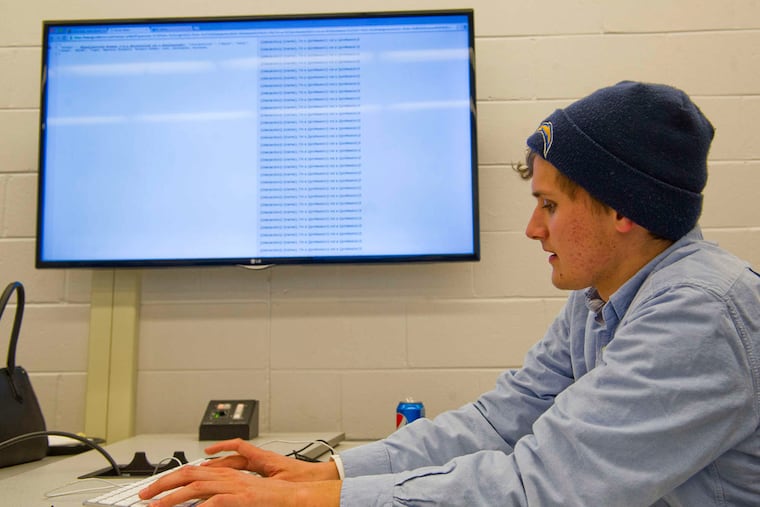Rutgers-Camden to explore intersection of tech, politics
When Donald Trump retweeted a quotation attributed to him but actually uttered by Italian dictator Benito Mussolini - "It is better to live one day as a lion than 100 years as a sheep" - it was a victory for Gawker, which had set up the automated Twitter account to poke fun at the Republican front-runner.

When Donald Trump retweeted a quotation attributed to him but actually uttered by Italian dictator Benito Mussolini - "It is better to live one day as a lion than 100 years as a sheep" - it was a victory for Gawker, which had set up the automated Twitter account to poke fun at the Republican front-runner.
It was also perfect fodder for a new digital politics program at Rutgers-Camden, which melds political science with digital studies.
"The digital is not incidental to the conversation; it is core to the conversation," said Jim Brown, the English professor who heads the Digital Studies Center at Rutgers-Camden.
The university's digital politics certificate will be launched in the fall, with required core courses in digital studies and political science, a set of modified political science electives that include digital components, and a capstone project. It will be jointly run by the Digital Studies Center and Rutgers-Camden's political science department.
Mark Baker, 20, of Cherry Hill, plans to pursue the certificate because of his interest in how digital media have made news and information more accessible.
"Media and Internet really transform how we look at politics. We access news and other information from social media, news outlets, and that's the way we go nowadays, so it's just interesting to observe that sort of outlet for where we're getting that information," said Baker, a political science and philosophy major who is taking the introductory digital studies course. He'll be a senior in the fall.
"What this certificate does is it allows our students to think more comprehensively, more systematically about how this technology is changing the nature of politics nationally, internationally, state and local, at all different levels," said Richard Harris, chair of the political science department.
That study will go beyond the presidential elections that capture so much public interest every four years, he said.
Regulatory agencies, for example, now take public comment online, which can lead to increased participation. Companies, politicians, and advocacy groups, in turn, have a new means to try to influence policy, as seen in organized comment campaigns when the FCC sought comment on net neutrality and the FAA solicited input on drone usage.
"It's not just Trump and his Twitter feed," said Harris, who also cited the rise of easy online fund-raising tools. "Campaigns are able to use their Web presence and fund-raising to get their own financing; it doesn't take that much. Back in the bad old days, Bernie Sanders would have been crushed a long time ago; he wouldn't have any money."
Political science is the first department to partner with the Digital Studies Center for a full-fledged program, and Brown is hoping to work with other fields. The center is meant to be interdisciplinary; a digital studies major currently pending university approval would require students to take a second major.
For the digital politics program, that means taking broad survey classes of both digital studies and political science.
"Political science students get to sort of plug into this new, burgeoning area, and people from across campus get to go to political science and fill in electives," Brown said.
"If we're going to build a truly interdisciplinary program, I want the computer science student in that digital politics class; I want the history student in that digital politics class, so that the knowledge is moving in both directions," he said.
Harris described degrees and certificates as "sort of the coin of the realm when people go out in the job market."
"If we just train our students in our courses to think about this stuff and they don't think about the practical skills, then they're not going to be as competitive," Harris said, "whether it's getting a job working for the Republican or Democratic Parties or working for a candidate or working for an advocacy group on the left or the right."
About 10 existing political science courses will be modified to include more focus on digital technology or to incorporate digital tools to study political science, Harris said. That will require training for some professors, including himself, he said.
Harris said the Digital Studies Center will help political science faculty, who already have "a clear sense that the ground is shifting under everyone's feet in politics, whether it's national or international, whatever.
"But just having that sense isn't enough to really educate our students," he said. "We have to have a real appreciation of what are the possibilities of digital technology and social media."
The hope is to create a political science program with a better understanding of digital technologies and a digital studies program with a better understanding of technologies' societal impact and implications.
And political science students get to reap the benefits, if all goes well, of a more structured look at digital technologies as an object of exploration, rather than as just one part of a broader course of study.
For Baker, the political science student, the technological changes he sees today remind him of the world his father entered, as a Rutgers-Camden graduate in the 1980s with a minor in computer science who now works in computers.
Baker's father "rode the wave . . . of computers and their influence on, really, everyday life," he said.
Now, he said, it's his turn to take advantage of a changing world.
"I'm hoping that social media and digital media can ride that wave, as well," Baker said. "Maybe in 30 years, we can be talking about how it's really transformed everything we know."
856-779-3220@elaijuh